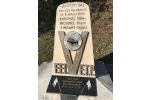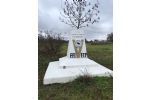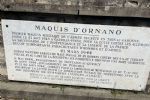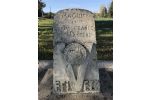Le maquis de Cabertat
Textes de la stèle :
En avril 1943, la Résistance s'organise à la ferme des Ombrails chez la famille Ricard. Le premier parachutage d'armes en Tarn-et-Garonne s'y déroule dans la nuit du 19 au 20 août 1943.
Un camp de nombreux réfractaires au S.T.O. s'y établit ensuite, mais il est repéré par l'occupant et attaqué le 20 juin 1944.
En avril 1943, la Résistance s'organise à la ferme des Ombrails chez la famille Ricard. Le premier parachutage d'armes en Tarn-et-Garonne s'y déroule dans la nuit du 19 au 20 août 1943.
Un camp de nombreux réfractaires au S.T.O. s'y établit ensuite, mais il est repéré par l'occupant et attaqué le 20 juin 1944.
Après plusieurs heures de harcèlement, les résistants se dispersent et l'ennemi se venge en torturant et en abattant six hommes du Corps franc et en incendiant les fermes où la famille Penchenat est anéantie au lance-flammes.
Dès le début juillet, les groupes reconstitués sont de nouveau opérationnels. Ils participent notamment au combat du Rond à Montauban (19 août 1944) et à la campagne des Vosges (octobre 1944- janvier 1945)...
Les événements sanglants de l'été 44:
Les événements sanglants de l'été 44:
17 juillet 1944-L'attaque des Brunis
le 17 juillet 1944, suite à une opération répressive menée par la Gestapo de Montauban avec la complicité de la Milice, plusieurs arrestations sont effectuées dans le secteur Négrepelisse-Montricoux. Henri Borderie et André Castel aux Ombrails commune de Negrepelisse, André Jouany, son frère Henri, Pierre Bonhomme, Pierre Feuillée, André Huguet, Camille Mazard, les frères Lespinet. Hugues et Lucien, René Cournut, Eugène Fournier et Michel Melamed à Montricoux.
le convoi, emmenant les 13 otages vers Montauban, est attaqué en cours de route au lieu-dit Les Brunis par des éléments du groupe Fantôme qui ont reçu l'ordre de l'intercepter. Le groupe est composé de sept hommes seulement: Georges Wrobel (Bob), André Bauer (Pépé). Marcel Loupiac (Le Cuistat), Pierre Guisti (Jim), Angelo Follano (Mistinguet), Maurice Dougé (Rigoulat) et Georges Jacquot (Marsouin) qui en prend le commandement. Lorsque le convoi arrive, Marsouin lance une grenade Gammon sur le capot du premier camion qui, soufflé par l'explosion, se déporte d'une quinzaine de mètres avant de s'immobiliser dans le fossé. Le convoi stoppe, Allemands el miliciens, tout d'abord abasourdis par la déflagration, reprennent leurs esprits. Une lutte aussi farouche qu'inégale s'engage alors.
Profitant de la situation plusieurs prisonniers tentent de s'enfuir: René Courmut (Cavaillé) et Eugène Fournier (Gégène) se sauveront en direction de la rivière. Malheureusement, Pierre Bonhomme et Pierre Feuillée, n'auront pas la même chance, ils seront Immédiatement abattus en sautant à leur tour du camion.
Devant la superiorité numérique et l'absence des renforts espérés, les maquisards décrochent en direction de la voie ferrée. Marcel Loupiac est tué avant d'y arriver, André Bauer est abattu au milieu de la voie et Georges Wrobel doit son salut au chargeur de mitraillette qu'll porte sur sa poitrine. Maurice Daugé transpercé de part en part par une balle parvient à s'échapper Malgré l'heroisme des hommes du Corps Franc, le bilan est lourd du côté des résistants: on déplore quatre morts dont Pierre feuillée, 30 ans, marié, père de deux enfants: Pierre Bonhomme, 33 ans, marié également, père d'un petit garçon, André Bauer, 23 réfugié juif d'origine alsacienne et Marcel Loupiac, 45 ans, marié père de famille.
Devant la superiorité numérique et l'absence des renforts espérés, les maquisards décrochent en direction de la voie ferrée. Marcel Loupiac est tué avant d'y arriver, André Bauer est abattu au milieu de la voie et Georges Wrobel doit son salut au chargeur de mitraillette qu'll porte sur sa poitrine. Maurice Daugé transpercé de part en part par une balle parvient à s'échapper Malgré l'heroisme des hommes du Corps Franc, le bilan est lourd du côté des résistants: on déplore quatre morts dont Pierre feuillée, 30 ans, marié, père de deux enfants: Pierre Bonhomme, 33 ans, marié également, père d'un petit garçon, André Bauer, 23 réfugié juif d'origine alsacienne et Marcel Loupiac, 45 ans, marié père de famille.
24 juillet l'éffroyable sentence.
Arrivés à Montauban, les prisonniers sont tout d'abord déposés au siège de la Feldgendarmerie, à l'hôtel du commerce. Ils sont alignés face contre le mur puis enchainés. Après avoir subi un premier interrogatoire et une fouille serrée, ils sont dépossédés de leurs papiers et de leur argent avant d'être transférés à l'ancien quartier de la cavalerie à la caserne Doumerc
A partir du lendemain, les prisonniers subissent des interrogatoires musclés .
Henri Borderie et Camille Mazard seront libérés dans la semaine.
Pour les autres, la sentence fut sans appel! Dans la nuit du 23 au 24 juillet, après avoir subi un ultime interrogatoire, les prisonniers sont embarqués dans des véhicules et conduits place du Maréchal Pétain, face à la préfecture, pour y subir leur supplice. Quatre d'entre eux, André Huguet, 49 ans, de Montricoux, marié, père de deux enfants, Henry Jouany. 38 ans. Montricoux, marié, père d'un petit garçon, André Castel, 37 ans, de Negrepelisse, marié et Michel Melamed, 39 ans de Caussade, seront pendus dos à dos aux acacias qui bordent la place.
Devant les sinistres préparatifs, Hugues Lespinet bondit, les mains liées derrière le dos, dans l'obscurité, il s'enfuit par la rue de la poste. C'est sans doute avant d'y arriver qu'il sera touché par une rafale de mitraillette. Il sera retrouvé le lendemain dans un jardin de la rue des Doreurs, gisant dans une mare de sang. Bien qu'atteint de plusieurs balles, il trouve la force de raconter au préfet Maurice Vincent, le tragique épisode de la nuit passée, lui confirmant qu'il s'est enfui lorsqu'on pendait ses camarades. Transporté à l'hôpital et malgré les soins qui lui seront prodigués, dont deux transfusions sanguines successives, le pauvre Hugues Lespinet ne survivra, malheureusement, pas à ses blessures. Il s'est éteint le 24 juillet au soir, il avait 33 ans, il était marié et père de deux enfants.
Montech - 26 juillet 1944-Au comble de la barbarie
Tandis qu'à Montauban, sont enterrés les corps des malheureux pendus, un autre drame, atroce, se trame dans les locaux de la Gestapo. En effet, après les événements dramatiques de la nuit du 23 au 24 juillet, on est toujours sans nouvelle des deux derniers otages, André Jouany (La Goupille) el Lucien Lespinet (Lucas), arrêtés le 17 juillet dans leur village de Montricoux. Ont-ils réussi à fausser compagnie à leurs bourreaux lors de la funeste nuit où leurs compagnons d'infortunes ont été pendus? Ont-ils été repris?
Une petite lueur d'espoir, de les voir réapparaître sains et saufs, subsiste pourtant dans leurs familles déjà cruellement endeuillées. Mais la réalité s'avère bien plus terrible encore.
Dans la soirée du 26 juillet 1944, les deux prisonniers ont été emmenés au lieu-dit « Châteauroux », à la lisière de la forêt de Montech. Enchaînés, dos à dos, on les a fait descendre dans une fosse préalablement creusée par les militaires Allemands. Un membre de la Gestapo tire à deux ou trois reprises dans leur direction avec un pistolet. L'un des suppliciés, touché, entraine l'autre dans sa chute. Les Allemands rebouchent la fosse.
Marsouin donne l'ordre du repli. Les maquisards abandonnant leur camion décrochent. Cependant, Claude Bourlier (Cri-cri) se propose d'aller récupérer le pauvre Fournier, Jacquot s'interpose. les Allemands progressent de toutes parts. Il est trop dangereux de tender quoi que ce soit pour lui porter secours. Cependant, Cri-cri n'écoute pas les conseils de son cher, il se porte auprès du blessé, accompagné de Raymond Droutman (Fine Oseille). Ils réussissent à le trainer dans une maison toute proche, aidés par les propriétaires du lieu. Ils le camouflent tant bien que mal. Les Allemands approchent, la propriétaire des lieux donne des habits civils à Cri-cri qui s'habille hâtivement et monte au grenier d'où il lance une grenade. Des Feldgendarmes surgissent en criant Terroristes Terroristes , Fine Oseille et les habitants de la maison, lèvent les bras, ils réussirent à s'enfuit pendant que les Allemands montent à l'étage à la poursuite de Cri-cri. Ce dernier est immédiatement fait prisonnier. Malheureusement, le blessé découvert à son tour subit le même sort. Tous deux sont emmenés. Eugène Fournier sera dans un premier temps transporté à l'hôpital de Montauban, mais devant la gravité de son état la police allemande le fera transférer à Toulouse dans l'espoir de le soigner pour le faire parler . Il reussira quelques jours plus tard à se sauver (à la faveur de in libération de Toulouse semble-t-il). Quant au pauvre Cri-cri), il aura moins de chance Son corps sera découvert dix jours après. flottant dans les eaux du Tarn aux Albarèdes à Mautauban. Pieds et poings liés dans le dos, il a reçu une balle dans la nuque Sans doute, a-t-il été froidement abattu non sans avoir été copieusement torturé. Il y a également une victime civile à déplorer, un dénommé Miserac Dominique requis par les Allemands, mort ou volant de son véhicule.
Ce n'est qu'un mois plus tard, après le départ des Allemands, que l'atroce calvaire des deux otages de Montricoux fut révélé, par des témoins, aux autorités de Montech. L'examen pratiqué lors de l'exhumation des corps des malheureux par le docteur Parot, en présence des gendarmes de Montech, révélera qu'ils étaient vraisemblablement en vie lorsqu'ils ont été ensevelis. De plus, André Jouany qui portait une abondante chevelure a été découvert complètement chauve, signe évident des tortures infligées par ses bourreaux. L'émotion fut grande à Montech, mais bien plus encore à Montricoux où une foule nombreuse est venue assister à leurs obsèques.
-André Jouany avait 35 ans, il était marié et père d'un petit garçon,
-Lucien Lespinet avait 27 ans, il était lui aussi marié et père de deux enfants.
A quelques mètres du lieu de leur supplice, en bordure de route, une stèle rappelle leur sacrifice et tous les ans à la date anniversaire, une cérémonie est organisée pour leur rendre hommage.
7 août 1944- L'accrochage d'Albias
Tandis qu'un groupe de maquisards de la première section de Corps Franc Dumas, commandé par Georges Jacquot (Marsouin) surveille la route nationale, lors d'une mission de réquisition à Albias, surgit une colonne allemande venant de la direction de Caussade. L'affrontement est inévitable. Eugène Fournier (Gégène) ouvre immédiatement le feu avec son fusil mitrailleur, ses camarades lancent leurs grenades vers les camions et ouvrent le feu à leur tour. Le premier camion finit sa course contre un platane, les autres stoppent. Les soldats Allemands sautent des véhicules et se déploient en ripostant. Malheureusement, Gégène, touché, s'affaisse derrière son fusil mitrailleur devenu soudainement silencieux. Il est impossible de pouvoir se rapprocher de lui sans risquer d'être atteint par les projectiles ennemis
Marsouin donne l'ordre du repli. Les maquisards abandonnant leur camion décrochent. Cependant, Claude Bourlier (Cri-cri) se propose d'aller récupérer le pauvre Fournier, Jacquot s'interpose. les Allemands progressent de toutes parts. Il est trop dangereux de tender quoi que ce soit pour lui porter secours. Cependant, Cri-cri n'écoute pas les conseils de son cher, il se porte auprès du blessé, accompagné de Raymond Droutman (Fine Oseille). Ils réussissent à le trainer dans une maison toute proche, aidés par les propriétaires du lieu. Ils le camouflent tant bien que mal. Les Allemands approchent, la propriétaire des lieux donne des habits civils à Cri-cri qui s'habille hâtivement et monte au grenier d'où il lance une grenade. Des Feldgendarmes surgissent en criant Terroristes Terroristes , Fine Oseille et les habitants de la maison, lèvent les bras, ils réussirent à s'enfuit pendant que les Allemands montent à l'étage à la poursuite de Cri-cri. Ce dernier est immédiatement fait prisonnier. Malheureusement, le blessé découvert à son tour subit le même sort. Tous deux sont emmenés. Eugène Fournier sera dans un premier temps transporté à l'hôpital de Montauban, mais devant la gravité de son état la police allemande le fera transférer à Toulouse dans l'espoir de le soigner pour le faire parler . Il reussira quelques jours plus tard à se sauver (à la faveur de in libération de Toulouse semble-t-il). Quant au pauvre Cri-cri), il aura moins de chance Son corps sera découvert dix jours après. flottant dans les eaux du Tarn aux Albarèdes à Mautauban. Pieds et poings liés dans le dos, il a reçu une balle dans la nuque Sans doute, a-t-il été froidement abattu non sans avoir été copieusement torturé. Il y a également une victime civile à déplorer, un dénommé Miserac Dominique requis par les Allemands, mort ou volant de son véhicule.
Contribution et crédit photo : Raphaël Mégard










